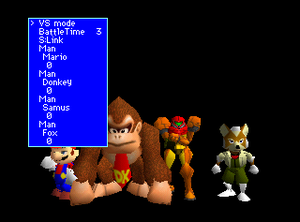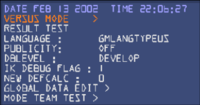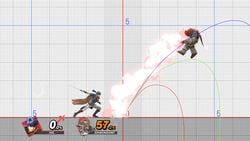Debug menu: Difference between revisions
(→Trivia) |
|||
| (39 intermediate revisions by 14 users not shown) | |||
| Line 1: | Line 1: | ||
{{ArticleIcons|ssb=y|ssbm=y}} | {{ArticleIcons|ssb=y|ssbm=y}} | ||
[[File:Debug Menu.png|300px|thumb|The Combat Debug menu in ''Super Smash Bros.'']] | [[File:Debug Menu.png|300px|thumb|The Combat Debug menu in ''Super Smash Bros.'']] | ||
The '''debug menu''' is a special menu in ''[[Super Smash Bros.]]'' and ''[[Super Smash Bros. Melee]]'' that can be accessed with the use of an [[Action Replay]]. The code that accesses the debug menu differs with each version of ''Melee''. | The '''debug menu''' is a special menu in ''[[Super Smash Bros.]]'' and ''[[Super Smash Bros. Melee]]'' that can be accessed with the use of an [[Action Replay]]. The code that accesses the debug menu differs with each version of ''Melee''. | ||
==Function== | ==Function== | ||
The debug menu was a feature that was used by the developers to test certain aspects in the game, generally as an attempt to prevent glitches or errors from appearing, hence its name of debug. The developers never removed the debug menu from the games, | The debug menu was a feature that was used by the developers to test certain aspects in the game, generally as an attempt to prevent glitches or errors from appearing, hence its name of debug. The developers never removed the debug menu from the games, and as a result, the debug menus can be accessed through devices such as an [[Action Replay]] or [[GameShark]]. | ||
The debug menu allows a player to do many different things in the game that normally would not be possible, such as gaining access to any [[character]], [[stage]], [[item]], and [[mode]] in the game, including those not accessible through normal play. They can also view all the [[trophy|trophies]], such as [[Samus Unmasked]], all character endings, and other features, including [[Beta elements (SSB)|unused elements]]. Players can also modify the actual gameplay, such as causing specific items to spawn at any spot, swapping movesets, or modify the [[Artificial Intelligence]] of the computer. | The debug menu allows a player to do many different things in the game that normally would not be possible, such as gaining access to any [[character]], [[stage]], [[item]], and [[mode]] in the game, including those not accessible through normal play. They can also view all the [[trophy|trophies]], such as [[Samus Unmasked]], all character endings, and other features, including [[Beta elements (SSB)|unused elements]]. Players can also modify the actual gameplay, such as causing specific items to spawn at any spot, swapping movesets, or modify the [[Artificial Intelligence]] of the computer. | ||
Using devices to access the Debug Menu, however, can be risky; the game can crash if the player uses incorrect parameters (such as attempting to play as [[NONE]], winning a game with | Using devices to access the Debug Menu, however, can be risky; the game can crash if the player uses incorrect parameters (such as attempting to play as [[NONE]], winning a game with {{SSBM|Master Hand}} or using [[AKANEIA]] as a stage). In the worst cases, the game can cause save games to corrupt in ''SSB'' or ''Melee'', or at worst, corrupt the entire card for ''Melee''; as such, it is generally recommended that it is not used with a memory card plugged in, or at least have a backup. | ||
In [[Masahiro Sakurai on Creating Games]], outside of debug mode use, Sakurai reveals that [[percentage]]s would often be set through manually assigning damage to certain moves, such as setting {{SSB|Fox}}'s [[forward tilt]] to deal 100%.<ref name="msomg"/> | |||
==In ''Super Smash Bros.''== | ==In ''Super Smash Bros.''== | ||
{{Main|Debug menu (SSB)}} | |||
In order to get to the debug menu, a [[GameShark]] or an emulator must be used. | In order to get to the debug menu, a [[GameShark]] or an emulator must be used. | ||
Combat Debug Includes: | Combat Debug Includes: | ||
| Line 19: | Line 20: | ||
*The player can gain access to any character, as well as boss characters. | *The player can gain access to any character, as well as boss characters. | ||
*The player can adjust the damage of each character. (Adjusting damage was not possible in the original game and ''Melee''. In ''[[Brawl]]'', one can adjust it via [[Handicap]]s). | *The player can adjust the damage of each character. (Adjusting damage was not possible in the original game and ''Melee''. In ''[[Brawl]]'', one can adjust it via [[Handicap]]s). | ||
*The player can make the [[CPU]] characters always | *The player can make the [[CPU]] characters always stop, walk, evade, or attack. | ||
*Changes cannot be saved. | *Changes cannot be saved. | ||
| Line 29: | Line 30: | ||
==In ''Super Smash Bros. Melee''== | ==In ''Super Smash Bros. Melee''== | ||
[[File: | {{Main|Debug menu (SSBM)}} | ||
[[File:DebugMenuMain.png|thumb|The debug menu in ''Super Smash Bros. Melee''.]] | |||
In order to get to the debug menu, an Action Replay device must be used. | In order to get to the debug menu, an Action Replay device must be used. | ||
Features include: | Features include: | ||
*The player can gain access to any stage, even ones not included in the final game, such as [[AKANEIA]]. | *The player can gain access to any stage, even ones not included in the final game, such as [[AKANEIA]], although many of them crash. | ||
*The player can gain access to any character, including [[Boss]]es and even [[Sandbag]]. | *The player can gain access to any character, including [[Boss]]es and even [[Sandbag]]. | ||
*The player can make the CPU characters always stop, walk, run, and attack. | *The player can make the CPU characters always stop, walk, run, and attack. | ||
*The player can use modes and CPU behaviors used in [[Events]] (see below). | *The player can use modes and CPU behaviors used in [[Events]] (see below). | ||
*The player can view hitboxes and animation data. | |||
*The player can have an unrestricted camera. | |||
*The player can simulate the results screen. | |||
*The player can erase data on the Memory Card. | *The player can erase data on the Memory Card. | ||
*Changes can be saved. | *Changes can be saved. | ||
== | ==In ''Super Smash Bros. Ultimate''== | ||
[[File:TrainingSSBU.jpg|thumb|250px|The trajectory display in Training Mode, originally a debug feature.]] | |||
In an episode of [[Masahiro Sakurai on Creating Games]], Sakurai reveals that the trajectory visuals in [[Training Mode]] were originally a debug mode feature. He also showcases the debug camera feature used for the ''Ultimate'' version of [[pic of the day]], including issues such as objects disappearing during use.<ref name="msomg">[https://youtu.be/AdBcCQtuATc Masahiro Sakurai on Making Games - Debug Mode <nowiki>[Programming & Tech]</nowiki>]</ref> | |||
== | ==References== | ||
{{reflist}} | |||
==See also== | |||
*[[Action Replay]] | |||
==External links== | ==External links== | ||
*[http://tcrf.net/Super_Smash_Bros./Debug_Menus Article on ''SSB''{{'}}s debug.] | |||
*[http://tcrf.net/Super_Smash_Bros._Melee/Master_Debug_Menu Article on ''Melee''{{'}}s debug.] | |||
*[http://tcrf.net/Super_Smash_Bros. Article on ''SSB'''s | |||
*[http://tcrf.net/Super_Smash_Bros._Melee/Master_Debug_Menu Article on ''Melee'''s debug. | |||
{{SSBMMenus}} | |||
[[Category:Hacking]] | [[Category:Hacking]] | ||
Latest revision as of 10:47, March 2, 2024
The debug menu is a special menu in Super Smash Bros. and Super Smash Bros. Melee that can be accessed with the use of an Action Replay. The code that accesses the debug menu differs with each version of Melee.
Function[edit]
The debug menu was a feature that was used by the developers to test certain aspects in the game, generally as an attempt to prevent glitches or errors from appearing, hence its name of debug. The developers never removed the debug menu from the games, and as a result, the debug menus can be accessed through devices such as an Action Replay or GameShark.
The debug menu allows a player to do many different things in the game that normally would not be possible, such as gaining access to any character, stage, item, and mode in the game, including those not accessible through normal play. They can also view all the trophies, such as Samus Unmasked, all character endings, and other features, including unused elements. Players can also modify the actual gameplay, such as causing specific items to spawn at any spot, swapping movesets, or modify the Artificial Intelligence of the computer.
Using devices to access the Debug Menu, however, can be risky; the game can crash if the player uses incorrect parameters (such as attempting to play as NONE, winning a game with Master Hand or using AKANEIA as a stage). In the worst cases, the game can cause save games to corrupt in SSB or Melee, or at worst, corrupt the entire card for Melee; as such, it is generally recommended that it is not used with a memory card plugged in, or at least have a backup.
In Masahiro Sakurai on Creating Games, outside of debug mode use, Sakurai reveals that percentages would often be set through manually assigning damage to certain moves, such as setting Fox's forward tilt to deal 100%.[1]
In Super Smash Bros.[edit]
In order to get to the debug menu, a GameShark or an emulator must be used.
Combat Debug Includes:
- The player can gain access to any stage, even the ones that are not in the final game, such as Kirby Beta Stage 1 or Kirby Beta Stage 2 and Final Destination.
- The player can gain access to any character, as well as boss characters.
- The player can adjust the damage of each character. (Adjusting damage was not possible in the original game and Melee. In Brawl, one can adjust it via Handicaps).
- The player can make the CPU characters always stop, walk, evade, or attack.
- Changes cannot be saved.
System Debug Includes:
- The player can play all sound effects, including ones not included in the final game, such as (what are presumed to be) Final Smashes.
- The player can test match-end animations, such as a paper airplane.
- The player can watch "New Character Signals" for every character.
- Changes can be saved.
In Super Smash Bros. Melee[edit]
In order to get to the debug menu, an Action Replay device must be used.
Features include:
- The player can gain access to any stage, even ones not included in the final game, such as AKANEIA, although many of them crash.
- The player can gain access to any character, including Bosses and even Sandbag.
- The player can make the CPU characters always stop, walk, run, and attack.
- The player can use modes and CPU behaviors used in Events (see below).
- The player can view hitboxes and animation data.
- The player can have an unrestricted camera.
- The player can simulate the results screen.
- The player can erase data on the Memory Card.
- Changes can be saved.
In Super Smash Bros. Ultimate[edit]
In an episode of Masahiro Sakurai on Creating Games, Sakurai reveals that the trajectory visuals in Training Mode were originally a debug mode feature. He also showcases the debug camera feature used for the Ultimate version of pic of the day, including issues such as objects disappearing during use.[1]
References[edit]
See also[edit]
External links[edit]
| Super Smash Bros. Melee menu items | |
|---|---|
| Vs. Mode | Melee (Time · Stock · Coin Battle · Bonus · Team Battle) · Custom Rules · Special Melee · Tournament Mode · Names |
| 1-P Mode | Regular Match (Classic Mode · All-Star Mode · Adventure Mode) · Event Match · Stadium (Target Test · Home-Run Contest · Multi-Man Melee) · Training |
| Trophies | Gallery · Collection · Lottery |
| Options | Rumble · Sound · Screen Display · Language · Erase Data |
| Data | Snapshots · Melee Records · Sound Test · Archives (NTSC only) · How to Play (PAL only) |
| Unused | Debug menu · Debug sound test menu |


